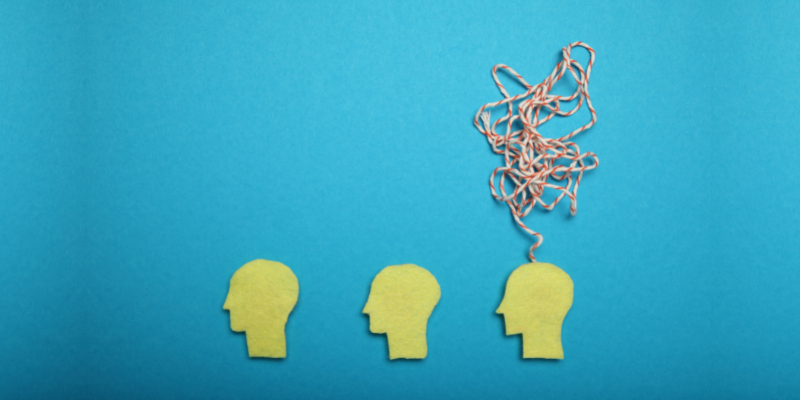“Stress is the body's reaction to feeling threatened or under pressure. It can be motivating to help us achieve things in our daily life, but too much stress can affect our mood, our body and our relationships.” These are the words of Dr Leah Austin, a GP & Nutritionist who is passionate about optimal health education, hormones, genetics and nutrition.

She goes on to explain: “Stress can make us feel anxious and irritable and affect our self-esteem. Experiencing a lot of stress over a long period of time can lead to a feeling of physical, mental, and emotional exhaustion.”
Stress – good or bad?
Although small amounts of stress can help us meet the demands of home, work, and family life, too much stress can be detrimental to both our mental and physical health. Since the start of the pandemic, over a year ago, many people have been feeling the effects of stress, whether that relates to home-schooling, losing work, or the general uncertainty surrounding us.

Dr. Leah is one of many doctor’s who have noticed this change amongst patients.
“During the height of the pandemic, patients were uneasy, however, most have adapted and embraced the new processes such as online consultation. There are however patients who still feel particularly anxious or have found their mental health to have been impacted - specifically those who are used to regular appointments such as those with chronic pain or older adults who have found the lack of face-to-face interaction more difficult.”
People all experience stress differently and in different situations. For some people stress is easy to spot, but for others it may not be clear straight away that they are stressed, and they might just keep on going without recognising the signs.

Physical signs of stress
Mental health charity ‘Mind’ suggests that stress can show itself in several different ways, stating that: “You might find that your first clues about being stressed are physical signs, such as tiredness, headaches or an upset stomach. There could be many reasons for this, as when we feel stressed, we often find it hard to sleep or eat well, and poor diet and lack of sleep can both affect our physical health.”
They go on to say: “Additionally, when we feel anxious, our bodies release hormones called cortisol and adrenaline. If you're often stressed then you're probably producing high levels of these hormones, which can make you feel physically unwell and could affect your health in the longer term.”

There are several other ways stress can show itself physically. These can include headaches, chest pain, fatigue, sleep problems and muscle tension or pain. But as US based health information experts Mayo Clinic state, stress not only affects your body physically, it can also affect your thoughts, feelings and behaviour.
Managing stress
When we look at how we can address stress, there is no single solution. The Mayo Clinic gives some practical tips for helping manage stress, including regular physical activity, practicing relaxation techniques such as deep breathing, setting aside time for hobbies, getting plenty of sleep, eating a healthy diet and avoiding excessive caffeine and alcohol.

Dr Leah Austin suggests that people can get into a ‘stress cycle’ which they find hard to get out of, and they need to seek out the things which can help them break this cycle. “My good friend, colleague & Harvard stress specialist Dr Safia Debar believes that you can break a ‘stress loop’ by incorporating certain activities or actions. These include exercise, laughter, connection, touch, the outdoors or controlled breathing.”

As well as avoiding excessive alcohol and caffeine, Dr Leah Austin believes diet can hugely impact mental health and mood. She says that: “Nutrition does impact mental health and good nutrition can, amongst other things, be used to support your natural dopamine production - the ‘feel good’ hormone which can help reduce stress.”
Muscle tension and stress
One of the physical ways stress can show itself is in muscle tension. This can be anywhere in the body, but quite often can be tension in the upper body and back.

According to Dr Leah. “If a person experiences a sudden ‘stress’, the muscles tense up all at once, and then release their tension when the stress passes. But if a person is stressed a lot of the time, the muscles in the body tend to be in a more or less constant state of guardedness.
“Muscle tension in the area of the shoulders, neck and head is common if you are stressed, and this can translate into other problems such as headaches and back pain. So it is advisable to try and address muscle tension sooner rather than later before the pain becomes chronic.”

Using NuroKor bioelectrical therapy
“If stress has translated into muscle tension for an individual, using bioelectrical therapy can be helpful to manage and reduce the pain.” says Dr Leah.
“Using a NuroKor device can help improve blood circulation, which in turn helps reduce muscle soreness, alleviate tension and improve muscle function.”

Furthermore, the NMS programme in NuroKor technology can assist in relaxing the muscles in a massage-like action. This can help reduce the feeling of stress – a secondary benefit of using bioelectrical therapy.
* * *
Stress is multi-faceted, both in how it shows itself physically and emotionally, as well as in how a person deals with it and addresses the stress. There are many stress management techniques which will work in different ways for different people. Bioelectrical therapy is one of those aids, and if used smartly, can help muscle tension and some of the other physical effects of stress.
For more information about Dr Leah Austin and her GP & Nutritionist based services visit her website or Instagram page.
If you need someone to talk regarding stress or your mental health visit the MIND helplines list.



